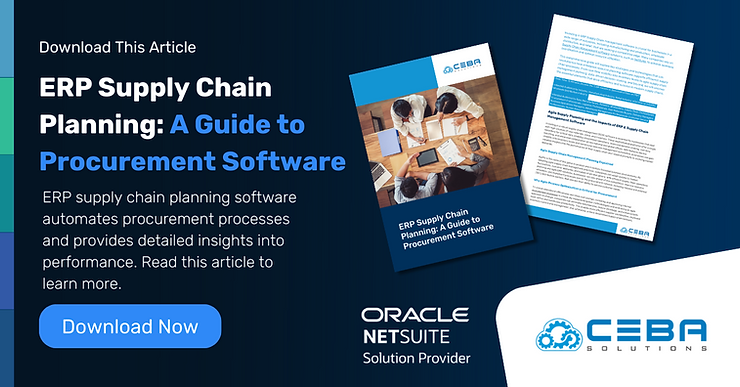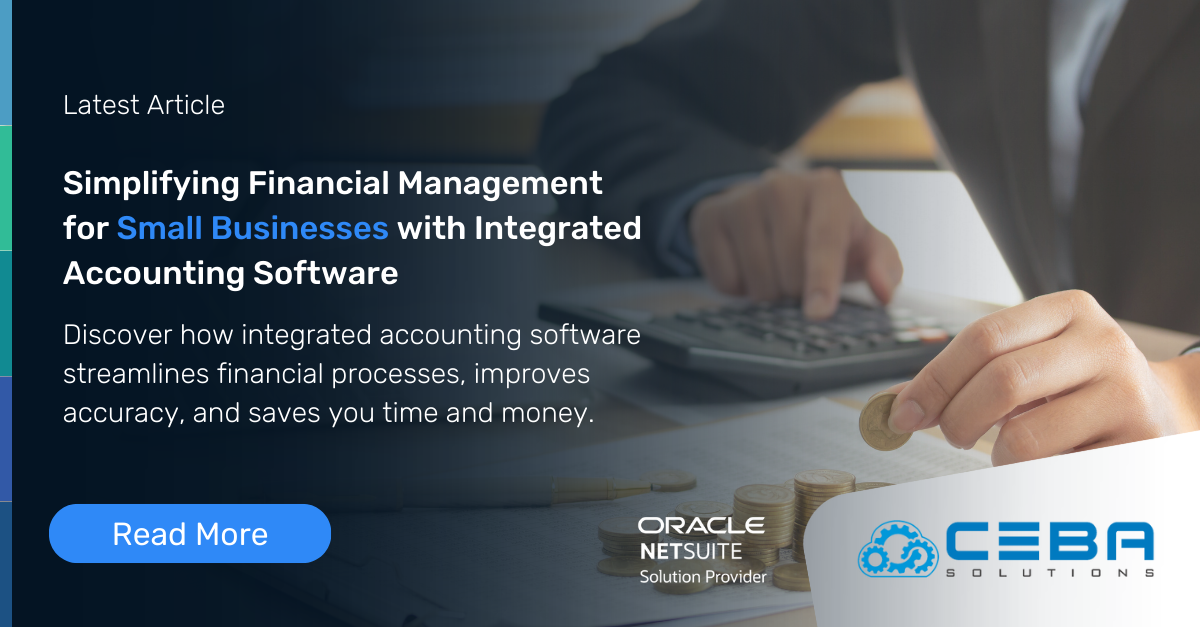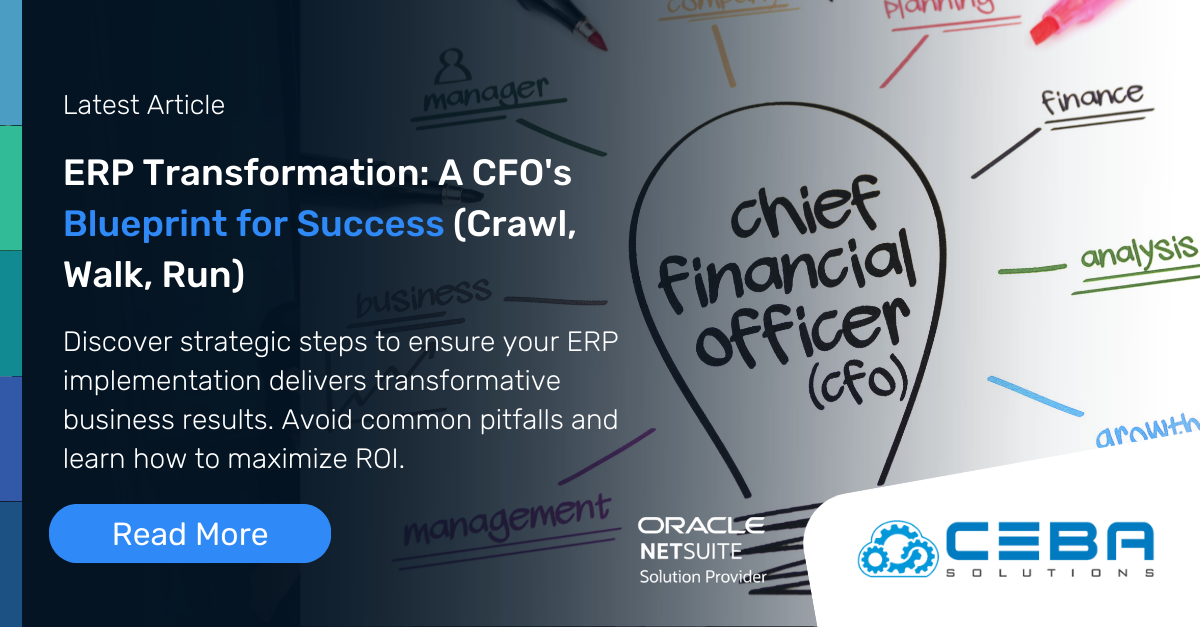ERP Supply Chain Planning: A Guide to Procurement Software
.png)
Read Time: 12 Minutes
Intended Audience by Industry:
Manufacturing Industry, Retail Industry, eCommerce Industry, Wholesale Distribution Industry.
Intended Audience by Role:
Manufacturers, Retailers, Wholesalers, Supply Chain Professionals, Procurement Professionals, Logistics Professionals, Raw Materials Buyers, Delivery Managers, Business Operations Managers, Warehouse Management Professionals, Customer Service Professionals, Human Resources Managers
Investing in ERP Supply Chain management software is crucial for businesses in a wide range of industries, including manufacturing and production, wholesale distribution, and retail, that are seeking a competitive edge. Many companies rely on Supply Chain Management software solutions, such as NetSuite, to achieve seamless coordination and optimal resource utilization.
This comprehensive guide will explore key strategies and technologies that can revolutionize how enterprise resource planning software supports efficienct supply chain processes. From real-time visibility into inventory levels to agile supply chain management planning, data-driven decision-making, and beyond, we will uncover the essential elements that drive efficiency and success in modern supply chains.
Agile Supply Planning and the Impacts of ERP & Supply Chain Management Software
Investing in a robust supply chain management (SCM) software is essential for businesses that deal with high volumes of raw materials, stock, and inventory. These sophisticated platforms offer a single repository for critical data, enabling streamlined operations, improved decision-making, real-time reporting, and enhanced collaboration across national and global offices. With features like live visibility into inventory levels and warehouse resource management automation, businesses can gain valuable insights into the performance of their supply chain and respond promptly to evolving market demands.
Agile Supply Chain Management Planning Explained
Agility is the name of the game in product and inventory focussed business environments. By adopting agile supply chain management practices, companies can adapt quickly to market fluctuations, customer demands, and supply chain disruptions. With efficient supply chain operations planning and agile ERP solutions, businesses can stay ahead of the competition, improve resource allocation, and implement processes across the procurement network, including internal and external (3PL) distribution centers, that elevate their ability to service customer needs.
"Efficient supply chain management involves continuously optimizing processes, leveraging data-driven decision-making, and enhancing supplier performance. By embracing agile practices, ensuring quality control, and utilizing advanced manufacturing software, businesses can streamline operations, reduce costs, and meet customer demands effectively." - Zabe Siddique, President - CEBA Solutions
How Data-Driven Decision-Making and Business Intelligence Lead to Lower COGS
In the era of big data, harnessing the power of information is essential. By leveraging data and analytics and actionable business insight become, businesses can make informed decisions that are driven by leading practices. Additionally, by incorporating machine learning and predictive analytics into supply chain processes, companies can forecast future demand accurately, improve market demand analysis, and improve material planning and resource availability.
Mastering Supply Chain Performance Evaluation, Monitoring, and Improvement
Evaluating supply chain performance is crucial for continuous improvement. By implementing supply chain disruption mitigation strategies, companies can proactively manage supply chain risks, implement effective plans to avoid these risks, and implement lean inventory management policies to lower the amount of stock that needs to be kept on hand, which ties up valuable capital that could be invested in developing new products, expanding into new sales channels which can all increase the bottom line. With a comprehensive procurment performance evaluation and centralized platforms for tracking KPIs, businesses can gain a 360-degree view of operations, identify areas for improvement, and enhance their procurement department's impact on profitability.
Strengthening Customer Relationships and Satisfaction Through Supply Chain ERP Workflow Automation
Customer satisfaction is paramount in today's competitive landscape. By integrating customer relationship management solutions into your supply chain processes, businesses can enhance customer interactions, improve customer retention strategies, and boost overall satisfaction. With detailed, real-time performance analysis and streamlined material flows, companies can promise to deliver products with superior quality to competitors and meet customer demands effectively.
Optimizing Operational Costs
Operational costs have a significant impact on a company's bottom line. Efficient supply chain management involves continuously identifying opportunities for cost savings and optimizing operational costs. By implementing strategies such as lean inventory management, effective resource allocation, and streamlined shipping routes, businesses can minimize costs and improve overall profitability.
Enjoying this article? You might be interested in learning more about Leveraging Data to Enable Better Procurement Decision Making.

Utilizing Supply Chain ERP and Manufacturing Software To Drive Efficiency on the Shop Floor
Manufacturing software plays a critical role in optimizing production processes. By leveraging advanced manufacturing software solutions, businesses can automate manual tasks, improve production capacity planning, and enhance overall operational efficiency. These tools provide real-time insights and actionable improvement suggestions, enabling enterprises to make informed decisions and drive continuous improvement on the shop floor.
Impacts of Intelligent Demand Planning Software on Resource and Production Scheduling
Real-time information is the lifeblood of effective supply chain planning, especially for manufacturers. By giving users access to live dashboards, businesses can enhance their ability to respond promptly to changes in demand and alter resource allocation and production schedules accordingly. This level of visibility enables better decision-making, reduces bottlenecks, and reduces costly delays in the supply chain process.
Streamlining Resource Conflict Resolution
Resource conflicts can hinder the smooth operation of a supply chain. Efficient supply chain management involves proactive identification and resolution of resource conflicts, ensuring that each component of the supply chain operates seamlessly. By implementing effective strategies for resource conflict management, businesses can avoid disruptions, streamline operations, and improve overall productivity.
Ensuring Quality Control for Finished Products
Maintaining stringent quality control measures for finished products is essential to customer satisfaction and business success. By implementing robust quality control processes within the supply chain, businesses can deliver products that meet or exceed customer expectations. This includes implementing checks and balances throughout the entire process, from sourcing materials to production and final delivery.
"Investing in ERP Supply Chain management software is crucial for businesses seeking a competitive edge in a wide range of industries. By leveraging real-time information, streamlining processes, and embracing automation, companies can unlock the full potential of their supply chain, driving operational excellence and improving customer satisfaction." - Zabe Siddique, President - CEBA Solutions
Business Impacts of ERP Solutions for Procurement Departments
Increased Transparency for Managing Complex Supply Chains
In today's globalized marketplace, many businesses operate within complex supply chains. Managing these complexities requires careful coordination, effective communication, and streamlined processes. By implementing comprehensive supply chain management systems, companies can navigate the intricacies of complex supply chains more effectively, reducing risks and improving global operations management.
Actively Monitor Supplier Performance
Suppliers play a vital role in the success of a supply chain. By effectively managing supplier relationships and monitoring performance, businesses can ensure a seamless flow of materials eliminating disruption to their production lines. By embracing key supply chain management strategies, such as performance evaluations and collaboration with a network of suppliers, businesses can improve overall operational performance.
Meet Delivery Dates and Timeframes More Consistently
Timely delivery is crucial in meeting customer expectations and maintaining a competitive edge. By effectively managing delivery dates and timeframes, businesses can ensure on-time delivery and customer satisfaction. This involves efficient coordination with suppliers, streamlined shipping processes, and real-time insights into delivery schedules.
Increasing Product Availability
Demand planning and product availability go hand in hand in supply chain management. By leveraging accurate market demand analysis intelligence, businesses can forecast future demand, automate production schedules, and ensure product availability when customers need it. This requires efficient material planning and forecasting, as well as effective coordination with suppliers.
Conclusion
Enhancing ERP supply chain planning processes is a continuous journey that requires a combination of robust software solutions, effective management strategies, and data-driven decision-making. By leveraging real-time information, streamlining processes, optimizing resource management plans, and embracing automation, businesses can unlock the full potential of their supply chain. With the right tools and strategies, companies can drive operational excellence, improve customer satisfaction, and achieve a competitive edge in the dynamic business landscape.


.png)




.png)


